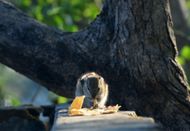Recent observations in California have surprisingly shown a shift in the dietary habits of ground squirrels, traditionally known for their granivorous diet consisting mainly of seeds and nuts. For the first time, researchers documented these squirrels actively hunting, killing, and consuming voles, which has astonished scientists and changed the understanding of these rodents' ecological roles.
Findings of a new study reported in the Journal of Ethology document this unprecedented event among California ground squirrels.
Jennifer Smith, lead author of the study who is an associate professor of biology at the University of Wisconsin-Eau Claire, told ABC7 Eyewitness News in an email:
“This research radically changes our perception of squirrels, one of the most familiar mammals in the world. In the face of human insults such as climate change and drought, these animals are resilient and have the potential to adapt to live in a changing world.”
Smith was quoted by The Guardian stating:
“This is incredibly exciting, because this is the first time for this species that we’ve documented active hunting from start to finish.”
“Once we saw it happening, it continued to happen again and again throughout the summer.”
Ground squirrels preying on voles

The research was carried out at Briones Regional Park in Contra Costa County, California, as a part of the Long-term Behavioral Ecology of California Ground Squirrels Project. Within twelve years of research from the University of Wisconsin-Eau Claire and the University of California, Davis, observations have been recorded on squirrels, but only came into view during this summer season of 2024, where they found squirrels that hunt voles (Microtus californicus) nearly every day starting June 10 and on July 30.
During this period, researchers recorded 74 interactions between squirrels and voles, with 42% involving active hunting behaviors. This included chasing down voles and biting them at vulnerable points like the neck or head. Once captured, squirrels typically consume the head before moving on to other body parts.
Smith told Live Science in an email:
“I was shocked, in disbelief, and, frankly, very excited to learn more about what was going on.”
He added -
"Not all hunts were successful, but once captured, the squirrels typically started to eat the head – bones and all – and then move to pull meat from the bones of the voles."
Nutritional demands may also impel squirrels to shift to carnivory. Protein is a restricted yet crucial resource for a squirrel, and hunting voles might be a means of accessing this resource far more efficiently than scrambling around for seeds and nuts. So this adaptability suggests ground squirrels might be more opportunistically omnivorous than is typically believed, with their diet changeable according to the food supply.
The development of this exploitative behavior occurred simultaneously with the local vole population increase. According to reports, the vole population was seven times the ten-year average during this period. Vole populations are cyclic and usually peak every three to five years; hence, this spike would have provided an abundant food source for the squirrels.
The Britannica Dictionary describes voles as:
“A small animal like a mouse that usually lives underground and that can be harmful to crops and gardens.”
